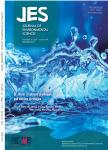Nano polystyrene microplastics could accumulate in Nile tilapia(Oreochromis niloticus):Negatively impacts on the intestinal and liver health through water exposure
作者机构:School of Basic Medical SciencesWuhan UniversityWuhan 430071China Key Laboratory of Freshwater Biodiversity ConservationMinistry of Agriculture and Rural AffairsYangtze River Fisheries Research InstituteChinese Academy of Fishery SciencesWuhan 430223China Hubei Province Key Laboratory of Allergy and ImmunologyWuhan 430071China
出 版 物:《Journal of Environmental Sciences》 (环境科学学报(英文版))
年 卷 期:2024年第137卷第3期
页 面:604-614页
核心收录:
学科分类:083002[工学-环境工程] 0830[工学-环境科学与工程(可授工学、理学、农学学位)] 07[理学] 08[工学] 09[农学] 0903[农学-农业资源与环境] 0713[理学-生态学]
基 金:supported by China Agriculture Research System (No.CARS-46) the Central Public-interest Scienti?c Institution Basal Research Fund,CAFS (No.YFI202208) the National Natural Science Foundation of China (Nos.31872554and 32172952)
主 题:Microplastics(MPs) Intestinal toxicity Liver toxicity Gut microbiome Lipid metabolism
摘 要:Microplastics(MPs)have become a significant concern for their potential ***,the correlation between the size of plastic particles and their toxicity remains ***,we investigate the toxic effects of different sizes(80 nm,800 nm,8μm and 80μm)polystyrene MPs(PS-MPs)on the model organism Nile tilapia(Oreochromis niloticus).The results of bioluminescent imaging indicate that the 80 nm PS-MPs are more likely to invade the body.H&E staining shows severe damage on the intestinal villi and distinct hepatic steatosis in the 80 nm *** U labeling shows that the proliferation activity of intestinal and liver cells reduces significantly in the 80 nm *** gut microbiome analysis shows a severe imbalance of gut microbiota homeostasis in the 80 nm *** analysis of liver transcriptomics and metabolomics shows that the liver lipid metabolism is disordered in the 80 nm *** conclusion,this study confirms that the 80 nm PS-MPs are more likely to induce intestinal and liver *** the above lay the foundation for further study on the pathological damage of MPs to other organisms.



